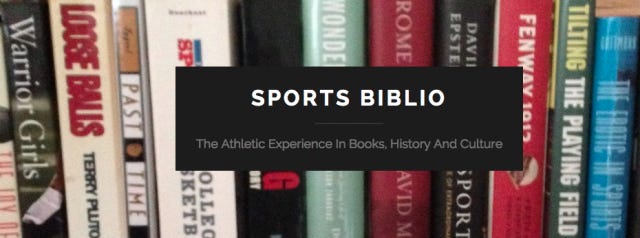A tribute to a sports historian; the demise of Grantland

Sports Biblio: The Website | Facebook | Twitter | Newsletter
This is an abbreviated version of the newsletter due to a death in my family.
My stepfather lost a long battle with emphysema, and I’ve been in Florida this week with my mother. He was a big sports fan, especially NASCAR (he was in the stands at the Daytona 500 the day Dale Earnhardt, his idol, was fatally injured) and the Georgia Bulldogs.
It’s been 35 years since famed radio announcer Larry Munson made his “Run Lindsay!” call in the Georgia-Florida game. That over-the-top euphoria prompted me to write about a newer wave of Southern college sports play-by-play men who are carrying on the tradition established by Munson, Cawood Ledford and many others.
I also paid tribute to the American sports historian Allen Guttmann, who has risen above the tendency in his field to view athletes and games through a small prism of cultural identity. Even more distinctive is his decades-long curiosity to examine to what degree sports and the arts intersect.
RIP Grantland
Just a few days after announcing 300+ layoffs, ESPN pulled the plug on Grantland on Friday, four years after its founding and five months after its creator, Bill Simmons, didn’t have his contract renewed and eventually landed at HBO.
Whatever you may think of Simmons, what he did to advocate quality online sports journalism and foster this standard for a younger generation of writers cannot be overstated. I liked the podcasts as much as the writing, including Zach Lowe on the NBA and Jonah Keri on baseball. And in a sea of overwrought and melodramatic sports media criticism, Bryan Curtis offered sensationally intelligent insight.
My favorite feature, however, was “Director’s Cut,” a dusting off of a classic piece of sports writing with a fresh intro, usually by sports book author Michael MacCambridge.
The very first “Director’s Cut” was an excerpt of “Pafko at the Wall” from Don DeLillo’s “Underworld,” with a link to a Grantland interview with the novelist.
This is the kind of variety and experimentation Grantland brought to the sports media space, at a time when digital innovation seemed to be all the rage. It was exciting to see others arrive in the same vein, and sadly, some of them also have gone, or are severely downsized. The online sports media realm is becoming an extremely risk-averse and uninteresting place, consumed by traffic-baiting, sensationalism and phony outrage. Worst of all, so many good writers have fewer good options to get properly rewarded for their work.
ESPN still keeps its shoutfest shows and layers upon layers of studio analysts, all spouting endless nonsense, but they are much more lucrative to Disney's corporate bottom line than a rollicking upstart affinity site. On the day Grantland died, Stephen A. Smith was a host of "SportsCenter." But while ESPN still retains many excellent journalists, there’s no longer a dedicated space in the biggest sports media entity of all for thoughtful writing and conversation about general sports topics. What a shame.
So it's more than a bit prophetic that Jason Whitlock, who also just left ESPN, riffed on the layoffs there, right before the Grantland news, with a lament about the demise of old-school journalism:
“Experience, insight, integrity and boots-on-the-ground journalism are no longer valued by the public, so now employers no longer value them, either.”
* * * * * * * *
Here are some other interesting links to pass along, and again, my apologies for not fleshing them out more:
There’s finally a German soccer museum, and it’s in Dortmund;
Hockey photographer Bruce Bennett marks 40 years of his best shots, and they’re simply gorgeous;
University of Michigan students are compiling historical multimedia “scrapbooks” of campus life, with a lot of great sports visuals;
The Economist wonders what has happened to the once-powerful West Indies cricket scene;
Tom Wolfe and Junior Johnson, 50 years after the former’s famous Esquire magazine piece of the stock car racing legend;
A “fantasy reading league” at a Massachusetts school trades footballs for books;
Kostya Kennedy on the shadow of the 1986 New York Mets;
An interview with Jill Bialosky on how to write a baseball poem;
A new book about the MMA tracks the careers of four fighters;
The Dear Nerd Book Podcast asks a question for which there is only one honest answer: Are you buying too many books? Hell, yes! Forever and always.


